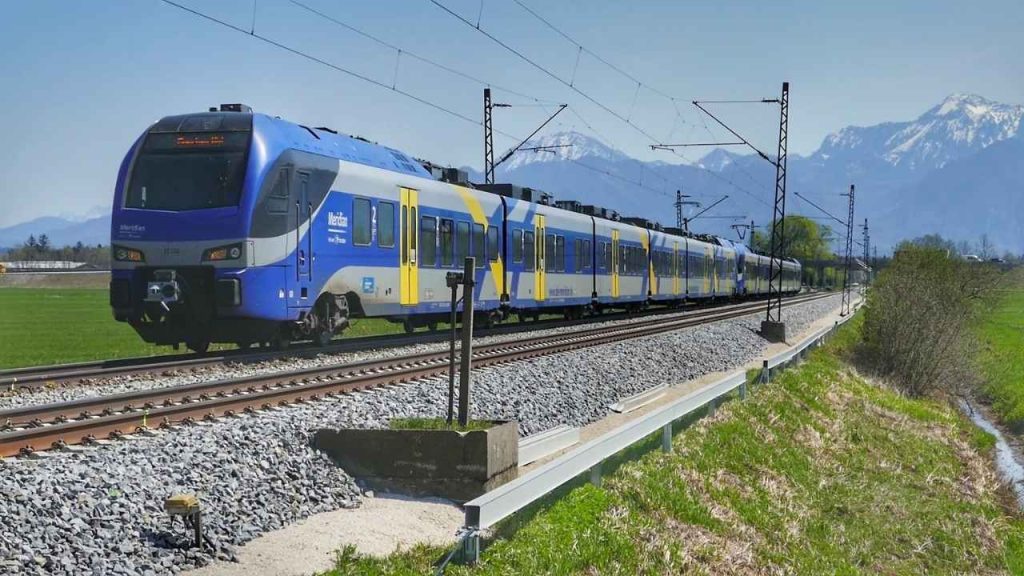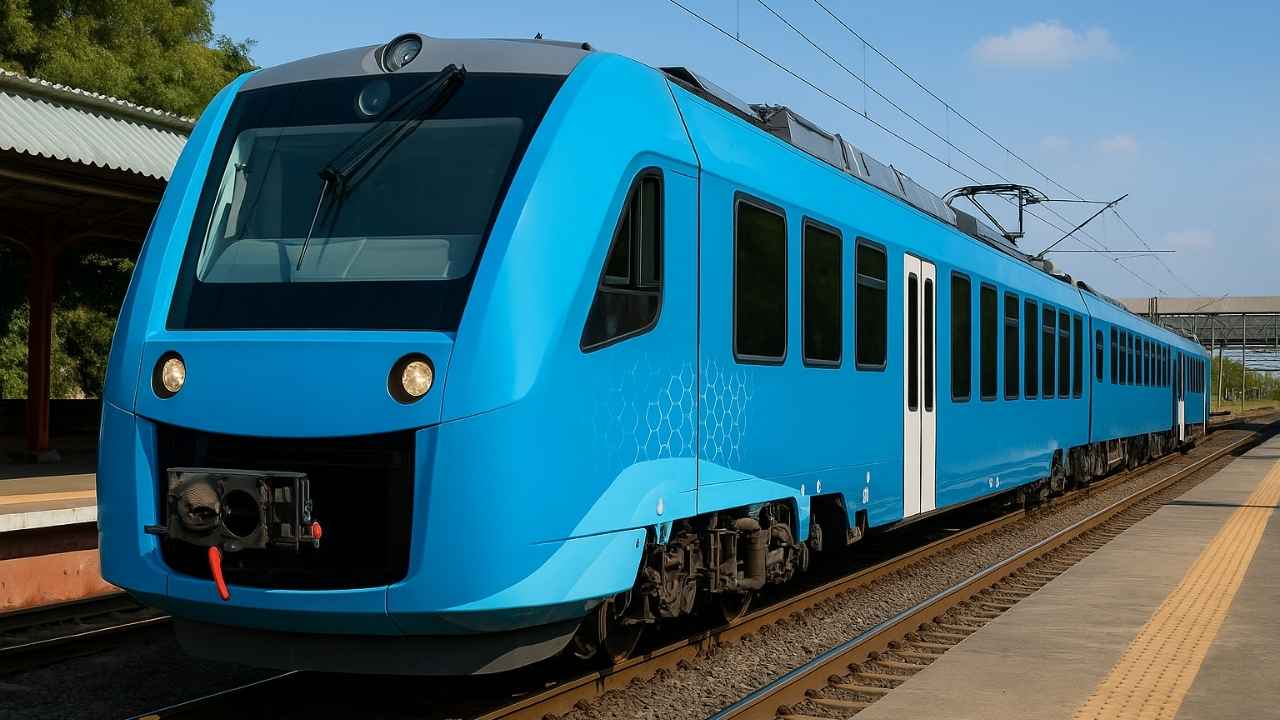India’s first hydrogen train is poised to transform the country’s rail transport sector with green, zero-emission technology. The Indian Railways recently achieved a significant breakthrough by successfully testing the first hydrogen-powered coach (Driving Power Car) at the Integral Coach Factory (ICF) in Chennai. This milestone marks India’s formal entry into an elite global club of nations—like Germany, France, China, and Sweden—that are actively pursuing hydrogen fuel cell-powered trains as part of their green mobility goals.
Table of Contents
Successful Test of Hydrogen-Powered Coach at ICF Chennai
On July 25, 2025, Union Railway Minister Ashwini Vaishnaw announced that Indian Railways had successfully tested its first hydrogen-powered Driving Power Car at the ICF Chennai. The announcement came via his social media platform X, where he emphasized,
“First hydrogen-powered coach (Driving Power Car) successfully tested at ICF, Chennai. India is developing a 1,200 HP hydrogen train. This will place India among the leaders in hydrogen-powered train technology.”
The tested unit is a 1,200-horsepower (HP) prototype, which—if fully developed—will make it the most powerful hydrogen-powered train in the world to date. The indigenous innovation was achieved entirely by Indian engineers, highlighting a leap in self-reliant sustainable mobility solutions.
A Giant Step Toward Sustainable Railways
The hydrogen-powered train, unlike traditional diesel trains, operates on hydrogen fuel cell technology—a clean energy system that emits only water and heat. This offers a significant reduction in air pollution, carbon emissions, and noise levels, especially critical in densely populated areas and ecologically sensitive zones.
According to Indian Railways, the development was not just a one-off achievement. The ICF team has been engaged in this R&D for over a year, and this successful testing now paves the way for trial operations on designated routes, particularly heritage and hilly sections, where diesel usage is still prominent. Some of the examples are, Kalka-Shimla route or the Puducherry route.
Upcoming Trial Route: Jind–Sonipat Section in Haryana
Contrary to earlier speculation (news of 31st March 2025, delivered by some media), the trial passenger train has not yet started running on tracks, but the route and infrastructure are being prepared. Indian Railways has selected the Jind–Sonipat section in Haryana, covering approximately 89 km, as the pilot corridor for the hydrogen train’s field trials.

A pilot project worth ₹111.83 crore has been sanctioned, involving the retrofitment of an existing Diesel Electric Multiple Unit (DEMU) with a hydrogen fuel cell. Once trials begin, the train is expected to have eight passenger coaches with a seating capacity of over 2,600 and a design speed of around 110 km/h.
“Hydrogen for Heritage” Vision and Nationwide Plans
The project falls under the Indian Railways’ larger vision titled “Hydrogen for Heritage”, which aims to replace diesel engines on scenic and historic rail routes with green hydrogen-based systems. Minister Vaishnaw had informed the Rajya Sabha earlier that Indian Railways plans to run 35 hydrogen trains under this scheme.
Each train is estimated to cost around ₹80 crore, with an additional ₹70 crore required per route for ground infrastructure—such as developed tracks, hydrogen refueling stations, and support facilities.
The initiative seeks to combine clean mobility with the tourism potential of India’s heritage railway sections like Shimla-Kalka, Siliguri-Kurseong-Darjeeling, and Nilgiri routes (Ooty-Coonoor), turning them into global examples of eco-conscious travel.
Cost and Efficiency: Long-Term Gains over Initial Costs
While the initial cost of running a hydrogen train is expected to be higher than conventional diesel or electric alternatives, experts note that the cost will gradually reduce as scale and production efficiency increase.
More importantly, the long-term environmental and strategic benefits far outweigh the initial investment. Hydrogen fuel offers:
- Zero carbon emissions, supporting India’s net-zero targets
- Reduced dependence on imported fossil fuels
- Lower long-term maintenance due to fewer moving parts compared to diesel engines
Additionally, India’s burgeoning focus on green hydrogen—powered by solar and wind energy—aligns perfectly with this clean rail initiative.
India Among Global Hydrogen Rail Leaders
With the successful coach test and a powerful 1,200 HP configuration in development, India is now seen as a global contender in hydrogen train technology. Most hydrogen trains in countries like Germany (Alstom’s Coradia iLint) operate in the 600–800 HP range, giving India an edge in terms of scale, speed, and passenger capacity.
Furthermore, by focusing on retrofitting existing DEMU rakes instead of procuring entirely new trainsets, India is adopting a cost-efficient and scalable model that could be replicated in other developing nations.
Hydrogen Fuel: Catalyst for a Broader Green Revolution
The hydrogen coach’s successful test is more than just a railway breakthrough—it’s a key building block in India’s clean energy transformation. The technologies developed for the hydrogen-powered train could soon be applied to:
- Vehicles for intercity and goods transport (Hydrogen buses, already started in Ladakh)
- Marine vessels like ferries and tugboats
- Stationary power backup systems in critical infrastructure
As the country moves toward an energy-secure and sustainable future, hydrogen is set to play a central role—both in transport and beyond.
When Will the Hydrogen Train Start Rolling?
Though an exact date is yet to be announced, officials have tentatively suggested that the first complete hydrogen-powered train may be operational by August 2025, depending on successful track trials and regulatory approvals (ICF will hand over India’s First Hydrogen Train to the govt. of India by 31st August).
Until then, the Indian Railways will continue preparing the Jind–Sonipat section and finalizing safety, operational, and maintenance protocols to ensure a seamless transition.
Conclusion
The development of India’s first hydrogen train is more than a technological milestone—it is a national commitment toward cleaner, smarter, and greener mobility. The successful coach test at ICF Chennai and the upcoming Jind–Sonipat trials mark the beginning of a hydrogen-powered era in Indian transportation.
As the country scales this innovation across regions and expands its hydrogen infrastructure, India is not only reducing its carbon footprint but also positioning itself as a leader in future-ready rail technology. With strong government backing, engineering excellence, and a clear sustainability roadmap, India’s first hydrogen train is set to reshape the future of eco-friendly travel.
Related Sources: MetrorailToday, India.com, The Hindu, FCW
Dr. Suvankar Das is a scientific advisor by profession, associated with a CRO organization. He pursued his doctoral degree in Chemistry in 2015. Later, he worked as a postdoctoral researcher & scientist in a couple of institutes/companies.
Besides his scientific journey, Dr. Das is also a passionate traveler and travel blogger. He loves to share all his travel experiences with other travelers so that everyone can enjoy hassle-free holidays with their own tour plans.
He believes, the most beautiful thing in this world is the WORLD itself. so there is no way to live like a clock; rather live it like a compass!





![Explore The World with Regent Seven Seas Splendor [World's Most Expensive Holiday @£1.7 Million] 7 Read more about the article Explore The World with Regent Seven Seas Splendor [World’s Most Expensive Holiday @£1.7 Million]](https://travelentice.com/wp-content/uploads/2024/07/Regent-Seven-Seas-Splendor-300x169.jpg)

